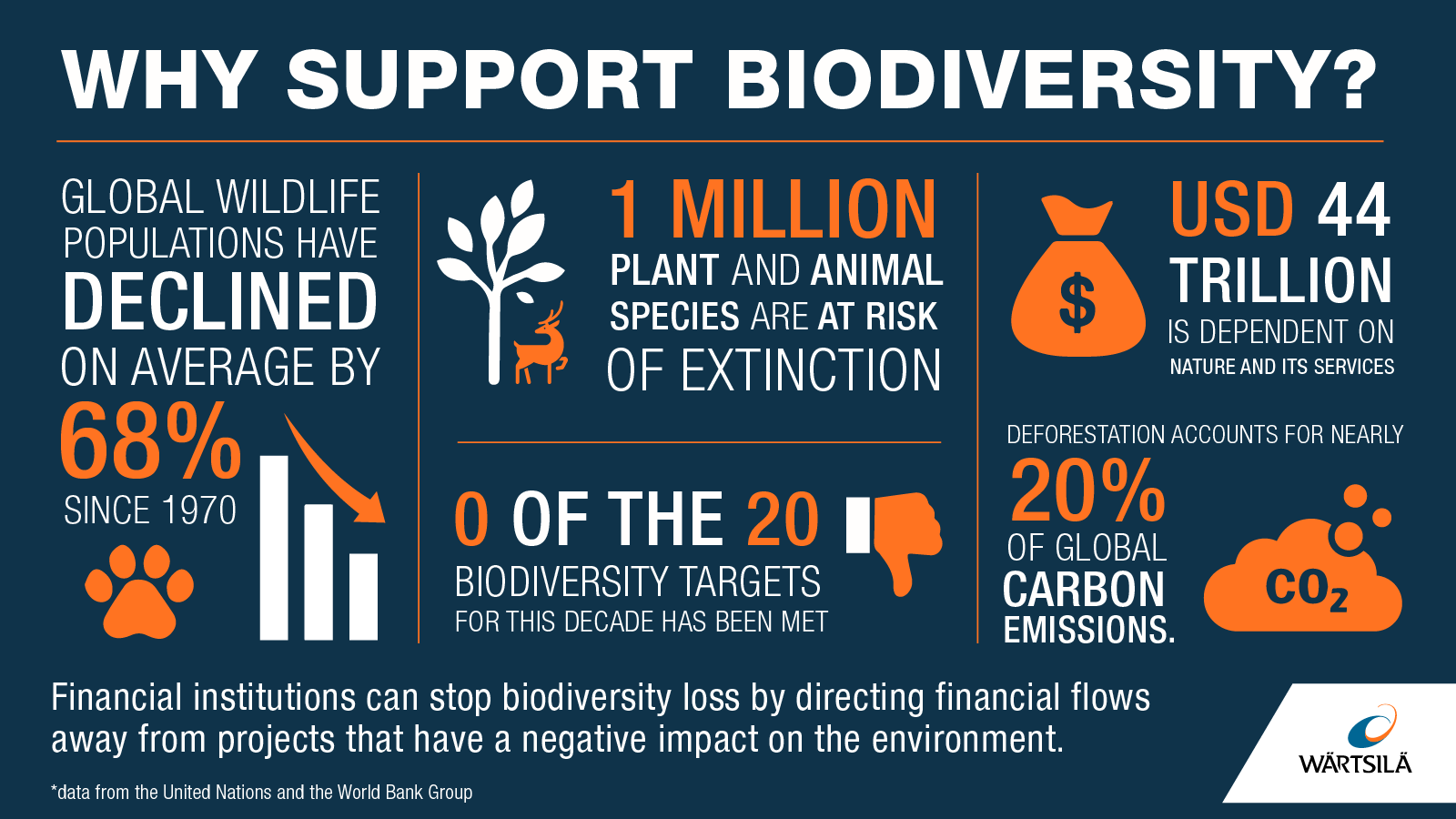

Biodiversity loss is as critical a challenge to the global economy as climate change, and financial institutions are beginning to recognise the role they can play in stopping it.
Awareness of the impact of biodiversity loss may not have captured the public imagination in the same way as climate change, but it is increasingly seen as a major global issue.
Biodiversity refers to the number and variety of organisms within a particular environment – be it on the scale of a garden pond or the entire Earth itself. In addition to its significance for the environment, biodiversity loss can also have devastating consequences for individuals, businesses and investors.
“Nature underpins our entire global economy,” says Raymond Dhirani, Head of Sustainable Finance at World Wide Fund for Nature (WWF) UK. “We rely on it for food and water, energy and medicine, climate regulation, pollination, and storm surge protection.
“And yet, despite global commitments to stop biodiversity loss, not one of the 20 biodiversity targets for this decade has been met, and global wildlife populations have declined on average by 68% since 1970. If the global economy had shrunk by this much, it would be like wiping the 10 largest economies from the world map.”
The United Nations (UN) estimates that one million animal and plant species are at risk of extinction – more than ever before – and many face being wiped out within decades. In addition, the average number of native species in most terrestrial habitats has dropped by at least 20%, mostly since 1900, according to a 2019 report.
A potential economic crisis
Meanwhile over half the world’s total gross domestic product (GDP) – an estimated USD 44 trillion – is dependent on nature and its services, according to the World Economic Forum. Any loss of biodiversity threatens serious ramifications on economies and livelihoods.
However, awareness of the importance of biodiversity has proved difficult to translate into action due to market and policy failures, as the World Bank Group’s (WBG) Mobilizing Private Finance for Nature report outlines.
The WBG argues that public funds are insufficient to reverse biodiversity loss and the financial sector has a critical role to play in addressing the global diversity crisis. But while biodiversity and climate change are inextricably linked, there are important differences between financing ways to tackle the two problems.
Climate finance has seen a lot of progress made through “financing green” – investment opportunities and subsidies in renewable energy, for example. But the approach of “greening finance” – directing financial flows away from projects which have a negative impact – has been slower in promoting change.
Financing biodiversity projects on a large scale is often hard, as they tend to be localised, small in scale and without cash flows to monetise. In addition, putting a price on nature – which is traditionally been seen as a free resource – provides additional challenges.
While residents of Western countries may put a high value on biodiversity in a rainforest, for example, an exporter of tropical hardwood who sees no market benefit to maintaining biodiversity is likely to continue to exploit it.
A force for change
This is where the finance sector – with more than USD 300 trillion invested in global capital markets – can be a powerful force for change, says Dhirani. “Financial institutions must not only commit to climate credible investing, such as halving financed emissions by 2030 and aligning portfolios to the Paris Agreement targets, but also help to halt the destruction of nature to bend the curve on biodiversity loss by the end of the decade.”
The WBG argues that introducing incentives for biodiversity conservation into existing business models, including supply chains, will have the biggest impact on tackling its loss and subsequent challenges.
Biodiversity policy must also address the underlying causes of biodiversity loss, and financial institutions, alongside policymakers, have started taking action – albeit slowly.
Impax Asset Management, based in London, specialises in investment opportunities arising from the transition to a more sustainable economy. It has invested in technology companies that help farmers assess their soil to help prevent overuse of fertilizers and pesticides, which can have a devastating impact on local ecology.
Meanwhile Netherlands-based ASN Bank has set a target of having a net positive effect on biodiversity as a result of all its loans and investments by 2030. It initiated the Partnership for Biodiversity Accounting Financials with other financial institutions to set up a standardised biodiversity accounting metric, thereby addressing the challenge of assigning value.
Norwegian financial services provider Storebrand has an investment policy to not contribute towards deforestation – which accounts for nearly 20% of global carbon emissions – by 2025. By then, it aims to not knowingly finance operations that are illegal, fail to protect high conservation value forests or land, or violate rights of local people and workers.
The world’s largest asset manager, BlackRock, also recently announced it would start recognising natural capital like biodiversity, forests and water in company evaluations. Describing climate risk as investment risk, BlackRock’s open letter to CEOs stated: “we believe that sustainable investing is the strongest foundation for client portfolios going forward.”
A sense of urgency
The global urgency of tackling biodiversity loss, not to mention climate change, has only been heightened by the devastating impact of the COVID-19 pandemic. But out of adversity comes an opportunity to rebuild better, with an emphasis on the environment.
“As we build back our economies, we must prioritise a green recovery that moves away from funding the destruction of nature and invests in solutions that will restore our natural world, power a sustainable future, and prevent further ecological breakdown,” says Dhirani.
Without the finance sector getting on board to help tackle the root causes of the climate and nature crisis, things will only get worse. The finance sector has the power to play a critical role in the formation of our sustainable economy.”

Did you like this? Subscribe to Insights updates!
Once every six weeks, you will get the top picks – the latest and the greatest pieces – from this Insights channel by email.

